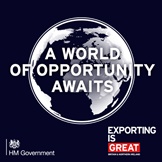
Whether you are just starting out, building your business or have reached a level of maturity, reputation is critical. No more so than when you are looking to export, move your business beyond the markets you started in and start operations in new territories around the world.
The ‘Exporting is Great’ campaign can provide ideas and opportunities for exporting but you have to be able to exploit them. This means, quite simply, being in a position sell to your company, as well as your products or services.
But what is the first thing that any of us does when we meet a new business contact or are looking to do business with a new company? We do an internet search. We look at their website, social media profiles and what has been said in the news about them.
Yes, according to studies, reputation contributes to shareholder value but it also ranks highly in why we do or, critically, do not do business with certain people or organisations. That may come down to a lack of trust or might come down to not wanting to be tainted by association. We are worried about how someone else’s reputation could impact on our own. We want to be associated with ‘winners’ and distance ourselves from ‘losers’.
The same thoughts will apply to anyone who might be thinking of doing business with you or your company.
There are, of course, always competing priorities both in times of attention and also finance as well. So here are a few straightforward steps you can take to protect and build your reputation. These apply to any organisation, of any size, whether they are new to exporting or more established players.
Keep an eye on what people say about you
This could be in the media, in online reviews and even in Parliament. These are the types of comments that everyone can find and take notice of and are all the things that people will check if they are doing any due diligence on you. You need to support the positive and rebut the negative. Do not let untruths go unchecked and if you have failings deal with them quickly, explaining the actions you have undertaken. The mention could be in a national paper in New Zealand, or the Parliament in Brazil. You should be aware of what is happening in all your bases.
Know that everyone can help
Reputation is not just the preserve of senior management. Consumers are often viewed as champions but what about employees as well? They are often under-utilised in helping to develop and defend a reputation. If your team aren’t prepared to stand up for you then who will? These people might exist at home, where you have operations or manufacturing plants, or in your new markets.
Bad news - be prepared
If the worse does happen and a crisis hits, could you cope? That can be even more of a pressing issue if you are dealing with export markets around the world. If you are UK-based, what happens if the problem arises on the other side of the world? If your HQ is in Manchester and Australia is a major market and something hits the papers or the net overnight, do you have a strategy in place to cope? It is how you are seen to deal with a problem and what you say and do in the immediate aftermath that can make or break a hard-earned reputation.
Do you know the people who can impact on your reputation?
Just who are your key stakeholders? They may champion what you do and talk about you publically. The more others say good things about you, the stronger your reputation will become. These type of independent voices are more trusted. They often have to be local as well – someone from the UK parachuted into speak about a problem in China will be less respected and carry less weight than a local voice.
Do you know where the future risks could come from – at home and abroad?
With knowledge comes the ability to take action. Reputations really take a hammering particularly when an organisation doesn’t do what it says it does, in other words it does not live by its own rules let alone those set by others. If you have weaknesses then be prepared to identify them and take action. These could be in a supply chain or in existing relationships. Again, the power of your whole team is critical as they can help identify such problems especially as you get used to operating in new markets in India or the Far East.
My experience in dealing with the organisations of all sizes and those exporting, sometimes for the first time, is that reputation is often thought about as something to be considered when they reach a certain large size. That is though often too late. The earlier that reputation is considered the better.
There are real business-focused reasons for spending time and effort in building and managing a reputation, not least when looking to exploit opportunities to export.
You can find global export opportunities on the Exporting is GREAT website. Visit the site for export leads, practical support and inspiration for UK companies who want to grow their business through export

